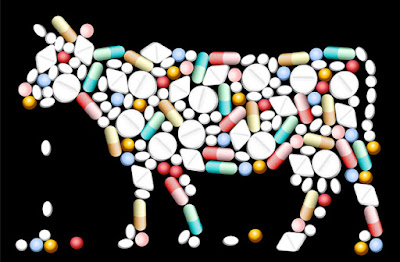INTRODUCTION
Probiotics are defined as live microbial food supplements which beneficially affect the host animal by improving its intestinal microbial balance. Probiotics are defined as live microbes which when administered in adequate amounts confer a beneficial health effects on the host.
The probiotics were improved feed conversion for the target species, reduced morbidity or mortality and benefits for the consumer through improved product quality. Probiotics were enhanced the growth of many domestic animals, improved the efficacy of forage digestion and quantity & quality of milk, meat and egg. Probiotics protected animals against pathogens, enhanced immunity response, reduced antibiotic use and shows high index of safety.
 |
| How probiotics affect animal health |
Bacterial probiotics were effective in chickens, pigs and pre ruminant calves, whereas yeast and fungal probiotics such as Saccharomyces cerevisiae and Aspergillus oryzae has given better results in adult ruminants. The combination of probiotics strains could increase the beneficial health effects compared with individual strains, because of their synergistic adhesion effects.
MICROORGANISMS USED IN PROBIOTICS
The microbial species recently being used in probiotics mixture are many and varied. The major microbial group such as Bacteriodes, Clostridium, Bifidobacterium, Eubacterium, Lactobacillus , Enterobactericeae, Streptococcus & Fusobacterium are commonly used in monogastric animals [pig, chicken, rabbit].On other hand, in polygastric animals[ such as cow, sheep and lamb] ,the rumen is the most vital microbial ecosystem with the majority of fibre degrading groups belonging to Fibrobacter, Ruminococcus, Butyrivibrio and Bacteriodes together with major groups such as Streptococcus, Prevotella, Selemonas, Lactobacillus and Megasphaera. Some products contain viable yeast and other fungi in addition to bacteria.
Lactobacillus, Bifidobacterium, Lactococcus, and Yeasts are classified in the category of organisms Gene rally Regarded as Safe [GRAS].
CHARACTERISTICS OF A GOOD PROBIOTIC
The culture should able to exert a positive effect on the host, it should be gram positive, acid resistant, bile resistant, non pathogenic, non toxic, culture should posses high survival rate and multiply faster in the digestive tract, adhesive capacity of microorganism must be firm and faster, able to resist the antibacterial activity that operate in the gut.
MECHANISM OF ACTION
A] Interaction between probiotics microbe gut epithelium- adhesion to mucosal cell epithelium, stimulation of mucous secretion, prevention of adhesion of pathogens as probiotics blocking intestinal receptors, thereby excluding pathogens, enterotoxins and hampering proliferation of pathogens, competition with pathogens for important nutrients ,secretion of antimicrobial and antitoxin substances that affects establishment and or replication of pathogens in the gastrointestinal tract
[B] Interaction with probiotics- immune system- immune modulation by innate as well as systemic ways, enhancing & reinforcing gut integrity and gut barrier function, eventually decreasing secretary and inflammatory molecules against microbial infection.
The general mechanism by which probiotics may have an effect can be divided into various categories- adhesion to the digestive tract wall to prevent colonization by pathogenic microorganisms, antitoxic effect, modulation of immune system, production of antimicrobial substances and competitive exclusion between probiotics and pathogenic bacteria.
EFFECTS OF PROBIOTICS ON ANIMAL HEALTH & PERFORMANCE
In ruminants yeast cultures can stimulate forage intake by increasing the rate of digestion of fibre in the rumen in the first 24 h after its consumption. This improvement in early digestion and intake is brought by alteration in the numbers and species of microorganisms in the rumen, results in improved feed efficiency, improved live weight gain, milk yield and milk fat content.
The use of probiotics in ruminants has primarily focused on improving ruminal fermentation efficiency ( by affecting feed digestibility and degradability and rumen micro biota), stabilization of rumen ph and lactate levels, enhanced fibre digestion, reduction of methane production in rumen, thereby impacting production performance. Probiotics are able to enhance nutrient absorption, improve gastrointestinal health, reduce diarrhoea and promote growth and development of the animals. Direct fed probiotics have been shown to reduce rumen acidosis. Lactobacillus and Bifidobacterium species have been shown to provide protection against enteric infection.
Protection against pathogens- the indigenous intestinal bacteria inhibits pathogens by competition to colonization sites and nutritional sources.
Immunomodulatory activity in gut by stimulating the secretion of immune modulators like IgA and cytokines in intestinal mucosa and thus improved disease resistance power
Pre ruminant calves-it was suggested that probiotics are beneficial for establishing and maintaining a positive microbial balance in newborn calves by decreasing the prevalence of coliform.
CONCLUSION
We conclude that probiotics have a positive effect on animal production by improving growth rate, and increasing milk and meat production.
In order to enhance the efficacy of probiotics, it is necessary to obtain additional knowledge on their mode of action. The efficacy of probiotics can be potentiated by several methods: the selection of more efficient strain; gene manipulation, the combination of several strains and the combination of probiotics and synergistically acting components. The adoption of logical criteria for the invitro selection of probiotics bacteria can result in the isolation of strain capable of performing effectively in the GIT.
